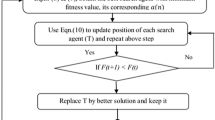Abstract
In this communication, one novel attempt has been made towards the design of minimum-phase finite impulse response (FIR) filter using one evolutionary computation technique, named differential evolution (DE) algorithm. Mean square error (MSE) between the frequency samples of the ideal filter and the designed filter in the pass-band and stop-band region and the minimum average error (MAE) between the frequency samples in the transition-band region had been considered for the formulation of the objective function in the optimization process. Performance of the optimization technique has been monitored in terms of convergence characteristics for four different orders of FIR filter under consideration. Robustness of our proposition has been firmly established in the sense that the proposed algorithm can be suitably tuned for the design of low-pass, high-pass or band-pass FIR filter of different specifications. Supremacy of the proposed algorithm over other existing techniques for the design of minimum-phase FIR filter has been substantiated by means of frequency response and pole-zero diagrams.










Similar content being viewed by others
References
Fotinopoulos I, Stathaki T (2000) Equiripple minimum phase FIR filter design from linear phase systems using a novel technique for polynomial factorisation. In: Proceedings of IEEE global telecommunications conference, vol 3, pp 1659–1663
Fotinopoulos I, Stathaki T (2001) Equiripple minimum phase FIR filter design from linear phase systems using root moments. IEEE Trans Circuits Syst II Analog Digit Signal Process 48(6):580–587
Kale I, Cain GD, Morling RCS (1995) Minimum-phase filter design from linear-phase start point via balanced model truncation. Electron Lett 31(20):1728–1729
Jovanovic-Dolecek G, Diaz-Carmona JJ (1998) High-pass minimum-phase filter design from linear-phase start point. In: Proceedings of 1998 second IEEE international caracas conference on devices, circuits and systems, pp 231–234
Gilchrist JH (1977) Design of minimum-phase finite-impulse-response digital filters. Proc Inst Electr Eng 124(8):665–668
Groth A, Göckler HG (1998) Design of equiripple minimum phase FIR-filters. In: Proceedings of the Eusipco III:1897-1900
Mian GA, Nainer AP (1982) A fast procedure to design equiripple minimum-phase FIR filters. IEEE Trans Circuits Syst 29(5):327–331
Pei SC, Lin HS (2006) Minimum-phase FIR filter design using real cepstrum. IEEE Trans Circuits Syst II Express Brief 53(10):1113–1117
Pei SC, Lu ST (1986) Design of minimum-phase FIR digital filters by differential cepstrum. IEEE Trans Circuits Syst 33(5):570–576
Dam HH, Nordebo S, Svensson L (2003) Design of minimum-phase digital filters as the sum of two allpass functions using the cepstrum technique. IEEE Trans Signal Process 51(3):726–731
Rasmussen JL, Etter DM (1994) An iterative quadratic technique for designing minimum phase filters. In: Proceedings of the twenty-eighth asilomar conference on signals, systems and computers, vol 1, pp 309–313
Venkata ND, Evans BL (1999) Optimal design of real and complex minimum phase digital FIR filters. In: Proceedings of the IEEE international conference on acoustics, speech, and signal processing, vol 3, pp 1145–1148
Sugita Y, Aikawa N (2003) A design method of minimum phase FIR filters with complex coefficients. In: Proceedings of the IEEE international conference on acoustics, speech, and signal processing, vol 6, pp VI-5-8
Karaboga N, Cetinkaya B (2003) Performance comparison of genetic algorithm based design methods of digital filters with optimal magnitude response and minimum phase. In: Proceedings of the IEEE 46th midwest symposium on circuits and systems, vol 2, pp 644–647
Chandra A, Chattopadhyay S (2014) A novel approach for coefficient quantization of low-pass finite impulse response filter using differential evolution algorithm. Signal Image Video Process 8(7):1307–1321
Storn R, Price K (1997) Differential evolution—a simple and efficient heuristic for global optimization over continuous spaces. J Glob Optim 11(4):341–359
Das S, Abraham A, Konar A (2008) Particle swarm optimization and differential evolution algorithms: technical analysis, applications and hybridization perspectives. Stud Comput Intell 116:1–38
Das S, Suganthan PN (2011) Differential evolution: a survey of the state-of-the-art. IEEE Trans Evol Comput 15(1):4–31
Konar A (2005) Computational intelligence principles, techniques and applications. Springer, Berlin
Author information
Authors and Affiliations
Corresponding author
Additional information
Publisher’s Note
Springer Nature remains neutral with regard to jurisdictional claims in published maps and institutional affiliations.
Rights and permissions
About this article
Cite this article
Moulik, A., Lahiry, S. & Chandra, A. Design of Minimum-Phase FIR Filter: An Evolutionary Approach. Proc. Natl. Acad. Sci., India, Sect. A Phys. Sci. 90, 359–369 (2020). https://doi.org/10.1007/s40010-019-00593-9
Received:
Revised:
Accepted:
Published:
Issue Date:
DOI: https://doi.org/10.1007/s40010-019-00593-9




